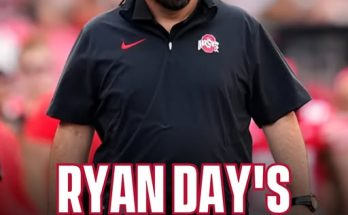Kris Russell’s time with the Edmonton Oilers may never be remembered for the flash and glamour that defines modern hockey highlights, but that is precisely what makes his legacy unique and quietly invaluable. In an era where offensive juggernauts like Connor McDavid and Leon Draisaitl dominate headlines and highlight reels, Russell’s contributions came in the form of grit, relentless sacrifice, and defensive mastery. He was not a player built to dazzle with end-to-end rushes or tape-to-tape passes; he was built to endure the grind, to throw himself into harm’s way, and to do the unglamorous work that often goes unnoticed but is critical for any team striving for success. His Oilers tenure, beginning in 2016, epitomized what it means to be a consummate team player who values stopping a goal as much as scoring one.
When Russell signed with the Edmonton Oilers, the team was in the middle of a transitional phase, trying to find a balance between nurturing their young superstars and building a stable defensive foundation. Russell was brought in as a steady veteran presence on the blue line, someone capable of calming things down during chaotic moments. While he was never known for putting up significant offensive numbers—indeed, he had more seasons without scoring a single goal than he did with multi-goal campaigns—his impact came in the form of intangibles. He was a mobile, defensive-minded defenseman who excelled in positioning, gap control, and stick work. Most importantly, he was a shot-blocking machine, willing to sacrifice his body in front of booming one-timers or point shots, regardless of the pain or risk involved.
Russell’s willingness to block shots is perhaps the most defining element of his career. He climbed the NHL’s all-time leaderboard for blocked shots, surpassing the 2,000-block milestone, a number that tells the story of his incredible commitment to defensive play. Every blocked shot represents a moment where he chose the team’s success over his own well-being, absorbing the full force of slapshots from some of the hardest shooters in the league. This wasn’t about padding stats or personal glory; this was about doing whatever it took to keep pucks out of the net. His dedication to this part of the game made him a coach’s dream and an invaluable asset on the penalty kill, where his fearlessness and impeccable timing often prevented dangerous scoring chances.
Critics, however, were not always as appreciative of Russell’s style. Much of the criticism centered around his contract, which some analysts and fans felt was too expensive for a player who didn’t contribute much offense. In an NHL era increasingly focused on puck-moving defensemen who can quarterback the power play and jump into the rush, Russell’s traditional defensive game seemed, to some, like a relic of the past. Yet such criticisms often missed the bigger picture. Kris Russell was never signed to be a power play quarterback or to rack up assists; his role was to stabilize the defensive zone, kill penalties, and make life easier for his goaltenders. In that regard, he excelled.
In many ways, Russell’s style of play was the perfect counterbalance to the Oilers’ offensive stars. While McDavid and Draisaitl were carving up opponents with dazzling speed and elite playmaking, Russell was ensuring that the defensive structure held firm. He took on tough defensive minutes, often against the opposition’s top lines, which allowed Edmonton’s stars to play with more freedom and confidence. It is this kind of behind-the-scenes contribution that often gets overlooked but is crucial for a team’s overall success.
Teammates and coaches alike have spoken highly of Russell’s character, work ethic, and leadership. He was the type of player who led by example, showing younger players what it means to battle every shift, regardless of the score or situation. His presence in the locker room was described as calming and professional, qualities that are invaluable during the ups and downs of an NHL season. While fans and media might focus on highlight goals or controversial trades, inside the dressing room, players like Russell earn immense respect for their willingness to absorb the physical and mental toll of the game.
Perhaps the most underappreciated aspect of Russell’s game was his hockey IQ. Blocking over 2,000 shots is not just about throwing yourself in front of pucks recklessly—it’s about knowing when and how to position yourself to take away shooting lanes, predicting where the puck is going, and timing your movements perfectly. Russell’s anticipation was exceptional, and he often prevented scoring chances simply by being in the right place at the right time. His calm demeanor under pressure and ability to read plays were vital components of Edmonton’s penalty-killing units during his tenure.
Russell’s critics often argued that blocking so many shots was a sign that his team didn’t have the puck enough, implying that his presence on the ice meant more time spent in the defensive zone. However, this argument overlooks the fact that every team, no matter how skilled, faces stretches of pressure in their own end—especially in the playoffs. In those moments, having a player like Russell, who could step in front of a rocket from the blue line without hesitation, was a difference-maker. While McDavid and Draisaitl garnered the spotlight for their offensive heroics, Russell was often the one quietly preserving leads or helping keep the game close.
As the game of hockey evolves, there will always be debates about the value of “traditional” defensive defensemen like Russell. The analytics community sometimes undervalues players who don’t contribute offensively, but for coaches and teammates, there is no question about the importance of players who are willing to do the dirty work. Russell’s ability to kill penalties, block shots, and play tough minutes against elite competition gave the Oilers a level of stability they desperately needed during a period when their defensive corps was often criticized for inconsistency.
Off the ice, Russell was known as a humble, hardworking individual who never sought the limelight. He didn’t make headlines with flashy quotes or social media antics. Instead, he let his play and his actions speak for themselves. That kind of quiet professionalism is often undervalued in an era dominated by big personalities, but it resonates deeply within a locker room culture that values team-first mentalities.
When Russell’s time with the Oilers came to an end, there wasn’t a grand farewell tour or a big celebration of his career. His departure was quiet, much like his playing style. But for those who followed his career closely—coaches, teammates, and dedicated fans—his contributions will not be forgotten. He embodied the kind of sacrifice and resilience that is necessary for building a winning team, even if it doesn’t show up on the score sheet.
Looking back, it is clear that Russell’s legacy in Edmonton is one of toughness, selflessness, and respect. He was the kind of player who absorbed punishment so others could thrive, who took pride in doing the hard, thankless work that allowed the Oilers’ stars to shine brighter. Without players like Kris Russell, the foundation that teams like Edmonton rely on would not be nearly as strong. His career is a reminder that hockey is not just about highlight-reel goals or spectacular saves; it is also about the small, gritty moments that win games—moments like sliding in front of a slapshot with seconds left on the clock to preserve a one-goal lead.
Even as time passes and the memories of his shot blocks fade from the nightly highlight shows, Russell’s name will remain on the NHL’s all-time list of blocked shots, serving as a testament to the sacrifices he made. For young defensemen coming into the league, his career serves as an example of how to carve out a role through determination, discipline, and a willingness to do whatever the team needs.
Kris Russell may not have been the kind of player who sold jerseys or filled highlight packages, but he was the kind of player every championship team needs. He was the one who did the unheralded work, who understood that winning hockey games requires more than just scoring goals—it requires preventing them, too. In a league that often values flash over substance, Russell’s career stands as a reminder that the heart and soul of hockey are found in the sacrifices players make for the team. His legacy with the Edmonton Oilers is defined not by goals or assists, but by courage, resilience, and an unyielding commitment to the game.



